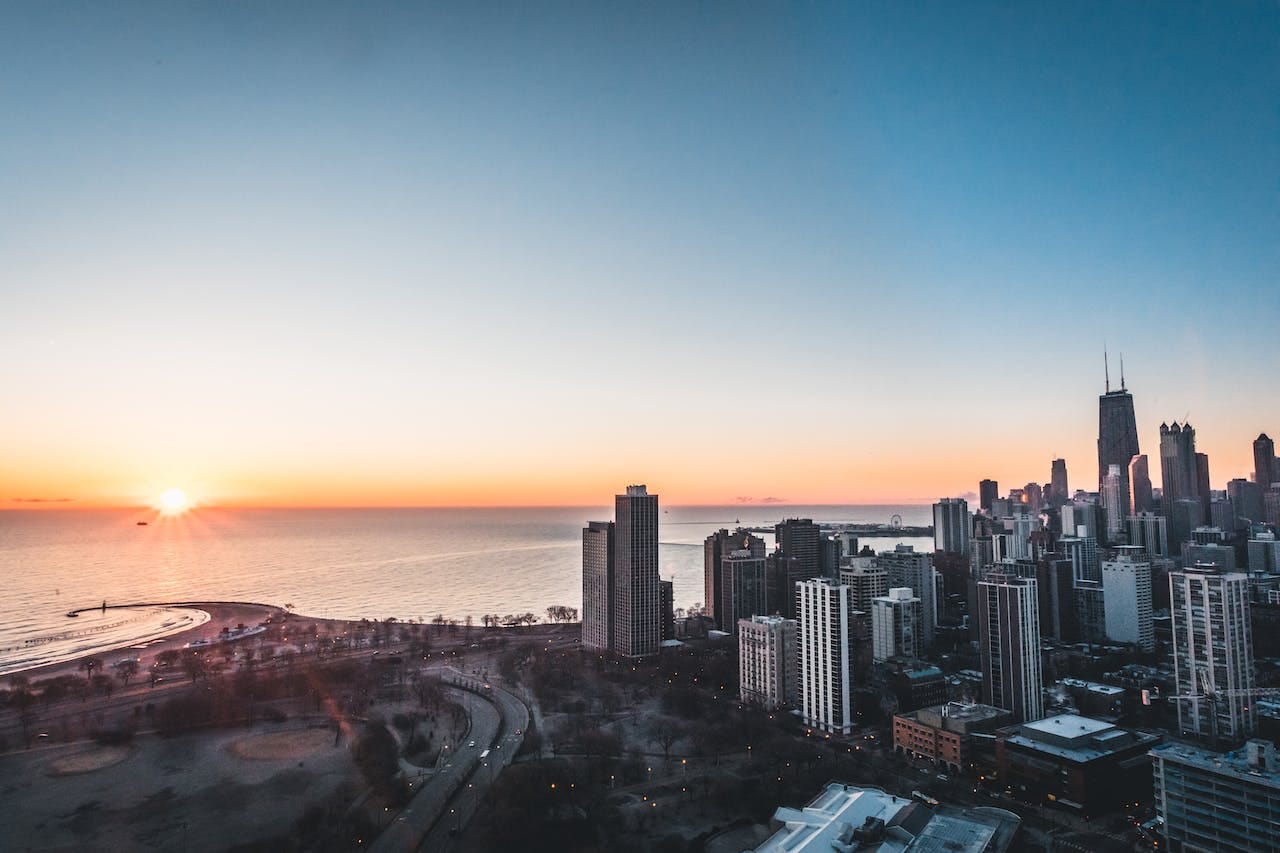Access thousands of exclusive scholarships
for free
When pursuing a legal education, choosing the right law school is an essential step that shapes your career and job prospects. The Chicago legal community is home to many top law firms and legal organizations. Amidst this thriving legal landscape are several reputable law schools with programs catering to a broad range of career interests and professional goals. Whether you aspire to become a skilled environmental lawyer, a public defender, a corporate attorney, or practice any other type of law, Chicago offers some of the most prestigious law schools in the nation.
In this Bold article, we’ll explore the best law schools in Chicago and other regions of Illinois, their unique program offerings, and why these schools shine as centers of excellence in legal education.
The cost of a legal education is a common factor influencing aspiring law students’ choice of school, and oftentimes, law students rely on student loan debt to fund their education. Applying for scholarships for law students can alleviate some financial pressures of attending law school.
Create a free Bold.org profile to browse and apply for law scholarships and other academic scholarships!

Criteria for Top Law Schools in Chicago
When researching the best law schools in Chicago, it's important to understand the criteria used to determine university rankings. Experiential learning opportunities, faculty quality, robustness of curriculum, reputation, and rankings are some of the factors you should consider.
Evaluating the Faculty and Curriculum
Experienced and dedicated professors can provide valuable research insights and career mentorship. When considering law schools, take the time to research the faculty members and their areas of expertise. Look for professors with extensive experience and a prestigious reputation in your legal niche of interest.
Look for schools that offer a broad range of courses, including specialized areas of law that align with your professional interests and career goals. A robust curriculum will provide you with a well-rounded legal education and expose you to various legal disciplines.
Consider the availability of experiential learning opportunities, such as clinics, internships, and externships. These practical experiences can enhance your legal education by providing hands-on training and exposure to real-world legal issues. They can also help you build a professional network and gain practical skills that will be valuable after graduation.
Get Matched to Thousands of Scholarships
Create your Bold.org profile to access thousands of exclusive scholarships, available only on Bold.org.
Create Free ProfileConsidering the School's Reputation and Rankings
Law schools with strong reputations and high rankings often have connections with prestigious law firms and legal organizations. These connections can provide you with valuable networking opportunities and increase your chances of securing internships, clerkships, and full-time job offers.
When evaluating a law school's reputation, consider factors such as the school's history, alumni success stories, and the accomplishments of its faculty members. Research the school's alumni network and see what alumni made significant contributions to the legal field after graduation.
Keep in mind that while world report rankings can provide a useful starting point for your research, they should not be the sole determining factor in your decision-making process due to their subjectivity.
Private vs. Public Law Schools in Chicago
Private law schools, such as Northwestern Pritzker School of Law and University of Chicago Law School, often have higher tuition fees but offer smaller class sizes and more personalized attention from professors. These institutions pride themselves on their rigorous academic programs and renowned faculty members who are experts in their respective fields.
Public law schools generally have lower tuition rates overall and offer reduced tuition for in-state residents. State-specific scholarships can further reduce the cost of attendance at these schools.
Campus Culture and Community
The campus culture and community of a law school can greatly influence your overall experience. Some schools may have a competitive atmosphere, while others foster collaboration and teamwork. Consider visiting the campuses, attending admissions events, or connecting with current students, alumni, and recent applicants to understand the school's culture and whether it resonates with your personality and career goals.
Ultimately, the best law school for you to study law will depend on your individual goals, interests, and circumstances. Consider all the criteria mentioned above and prioritize the factors that are most important to you.

Northwestern University Pritzker School of Law
Located just outside of Chicago in Evanston, Illinois, Northwestern University Pritzker School of Law is known for exceptional social justice research and interdisciplinary legal education. Northwestern offers a variety of trial team groups, clinicals, mentorship, and research opportunities to ensure that students gain well-rounded legal experience. As the oldest law school in Chicago, this university's strong alumni network and connections to prominent law firms provide valuable networking opportunities for students.
Northwestern University Pritzker offers an accelerated 2-year J.D. program, as well as a joint J.D./M.B.A. program with the highly ranked Kellogg School of Management and joint J.D./Ph.D. programs in conjunction with Northwestern Graduate School.
All students are required to take part in the Arlyn Miner First-Year Moot Court Program. There are about five legal journals for second and third-year students to participate in, as well as more than 30 student organizations. Through the senior research program, third-year law students can partner with a faculty member to conduct and supervise legal research, with the option to publish their work at the conclusion of the program.
Northwestern University Pritzker is the only T14 law school in the country that “strongly encourages” applicants to interview with the Admissions Committee on campus, according to the school’s website. As one of the top institutions to study law in the country, graduation outcomes are strong. For Pritzker’s class of 2025, the average LSAT score was 171, and the average GPA was 3.86. The law school’s acceptance rate is 19.3%.

University of Chicago Law School
As a T14 law school, the University of Chicago has a nationwide reputation of excellence, producing some of the most prominent political figures in United States history. The UChicago Law School is known for offering exceptional business/corporate law and contracts law education, in addition to an accelerated J.D./M.B.A. dual degree program with the Booth School of Business. The school ranks highly in constitutional law, tax law, criminal law, and international law education.
UChicago offers a range of J.S.D. (Doctor of Judicial Science), L.L.M. (Master of Laws), and M.L.S. (Master of Legal Studies) degree programs in addition to its Juris Doctor degree program. The university utilizes a unique interdisciplinary approach to legal education, which incorporates the humanities, social sciences, and natural sciences. Students can explore the intersections between law and other disciplines, such as economics, philosophy, and sociology, while attaining their law degrees.
A wide variety of legal clinics enables UChicago law students to build connections with some of the foremost members of the legal industry while specializing in their legal practice. This institution offers numerous opportunities for students to engage in public service and pro bono services, allowing prospective lawyers to gain practical experience while making a positive impact on the community.
First-year law students can connect with Chicago-based alumni mentors through the institution’s Affinity Mentoring Programs. Second- and third-year law students can compete in the Hinton Moot Court. The University also offers seven legal journals for students interested in publishing their research and more than thirty student organizations connecting students across their backgrounds and professional interests.
A number of UChicago Law alumni work for the Supreme Court due to the prestigious political reputation of this top University in the nation. The University of Chicago Law School class of 2026 has a median LSAT of 173 and an average GPA of 3.94, while the institution’s acceptance rate is 14.2%.

University of Illinois Urbana-Champaign College of Law
Though located outside of the Chicago area, the University of Illinois Urbana-Champaign College of Law is known for offering exceptional education in business and law, criminal law, environmental law, and public interest and government law, in addition to upper-level courses and experiential learning opportunities in Chicago. As one of the top law schools in the country, this institution utilizes a multidisciplinary educational approach in conjunction with experiential learning opportunities to prepare students to with practical legal experience.
University of Illinois College of Law offers a plethora of joint degrees with the University’s graduate departments, serving secondary fields of study in Computer Science, Human Resources and Industrial Relations, Journalism, Library and Information Science, Environmental Sciences, Political Science, Urban Planning, and an Interdisciplinary Study with a Master’s or PhD in any other degree program. The institution also offers J.S.D., L.L.M., and M.L.S. degree programs in addition to its J.D. degree program.
Community legal clinics and live-client courses enable Illinois Law students to exercise their legal skills according to their specialized interests. Second- and third-year law students may participate in the school’s robust set of moot court competitions. The Alumni-Student Mentoring Program enables first-year students to connect with Illinois Law alumni on university and bar exam success strategies. The institution offers six journals for students to participate in and nearly forty student organizations serving a range of demographics and professional interests.
The institution’s Chicago Program offers semester-long Chicago-based courses and events for third-year law students to broaden their exposure to specialized areas of legal practice while networking with alumni and prospective employers in the Chicago area.
Since it is a public institution, Illinois Law offers a more affordable option for all students residing in Illinois. The Illinois Law class of 2025 has a median LSAT score of 166 and a median GPA of 3.71, with an acceptance rate of 35%.

Loyola University Chicago School of Law
The Loyola University Chicago School of Law is renowned for its highly ranked health law specialty program and its convenient part-time law school option. The University's commitment to social justice and public interest law sets it apart from other institutions. The law school offers a variety of respected centers and institutes, including the Beazley Institute for Health Law and Policy and the Civitas ChildLaw Center.
For full-time students, Loyola University offers a range of J.D. and Masters dual degree programs with secondary concentrations in Political Science, Business Administration, Public Policy, and Social Work. LUC School of Law also offers Master’s of Law and Master’s of Jurisprudence degree programs, as well as an online Master of Jurisprudence degree in Children’s Law and Policy.
Loyola's location in downtown Chicago provides students with opportunities to engage with the city's legal community through internships and networking events. J.D. students gain hands-on legal training through live-client experience courses through externships, practica, and various clinical programs, including the federal tax clinic, the health justice project, and the legislation and policy clinic. Second-, third-, and fourth-year students may apply to compete in one of the school’s sixteen competing Moot Courts. LUC School of Law offers nearly ten journals and publications and an extensive list of student organizations in which to participate.
The LUC School of Law class of 2025 has a median LSAT score of 159 and a median GPA of 3.56, with an acceptance rate of 45.8%.

Illinois Institute of Technology Chicago-Kent Law School
As the second oldest law school in Illinois, the Chicago-Kent College of Law at the Illinois Institute of Technology is known for its highly ranked trial advocacy program, intellectual property law program, and its robust legal writing curriculum. Law students can concentrate their J.D. studies on a broad range of specialized certificate programs such as environmental and energy law, public interest law, business law, and international and comparative law.
Dual degree programs with the IIT Stuart School of Business include a J.D./M.B.A. program, a J.D./M.S. in Finance, a J.D./M.S. in Sustainability Analytics and Management, and a J.D./M.P.A. (Master of Public Administration) for students looking to practice law while attaining other degrees. The school’s flexible part-time law program allows students to take courses either during the day or in the evening with the option of a summer start. Chicago-Kent also offers a range of LL.M. degrees for lawyers seeking international qualifications who have earned a law degree outside the U.S. or Canada.
The Chicago-Kent College of Law 1L Your Way program enables first-year law students to customize their coursework by taking an upper-division elective course or a clinical course within their first year. Second-year students can compete in Moot Court when invited to join the Ilana Diamond Rovner Program in Appellate Advocacy. A range of mentorship programs connect alumni with current students, including a Women in Law Mentor Program, and students can participate in three journals and several student organizations.
All new students are considered for a range of scholarships, including the Chicago-Kent Honors Scholars Program, which awards full-tuition scholarships and research opportunities to a cohort of outstanding students. To find additional scholarships, check out this list of the top law school scholarships to apply for in 2023.
At Chicago-Kent School of Law, the median LSAT score is 159, and the media GPA is 3.61, while the acceptance rate is 50.5%.

Frequently Asked Questions About the Best Law Schools in Chicago
What are career opportunities for law school graduates?
Chicago is home to a plethora of law firms, legal organizations, and corporate headquarters. Graduating from a top law school in Chicago can provide you with access to a wide array of career opportunities. Networking events, career fairs, and internships can help you establish connections and open doors to future employment.
Examining a law school's bar passage rates and job placement statistics can give you insights into the school's track record of preparing students for professional success. High bar passage rates indicate that the school provides effective preparation for the bar exam, while strong job placement statistics suggest that graduates are finding employment in the legal field.
How should I prepare to apply to law school?
Prospective law school applicants should begin planning for law school early into their undergraduate studies. It is beneficial to choose an undergraduate major relevant to the field of law you intend to pursue. Taking a rigorous course load, participating in extracurriculars, and conducting research and independent study projects demonstrate an independence and academic drive that is highly attractive to admissions committees.
For additional guidance on the law school application process, check out this guide to getting into law school.
How can I finance a law school education?
Some law schools give scholarships and grants. Financial aid program information is generally available on law school websites. Many law schools offer these opportunities based on academic merit, financial need, or other criteria.
Additionally, you can explore scholarships by major and merit-based scholarships to find scholarships that are the best match for your particular demographic and background. It's worth exploring these options and reaching out to the financial aid offices of the law schools you are considering to learn more about other specific scholarships and grants available.
Be sure to sign up with Bold.org to find scholarships matching your background and educational goals that you can apply for today!


